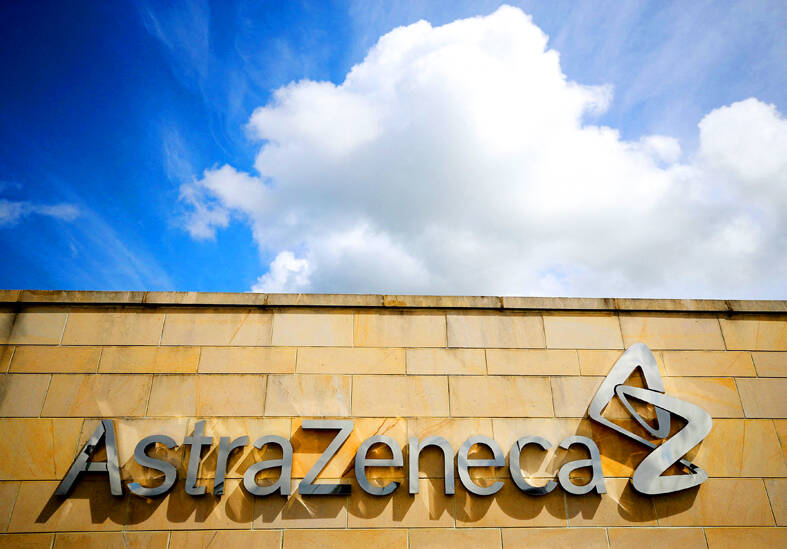UK pharmaceutical giant AstraZeneca PLC on Friday said that it was abandoning plans to build a £450 million (US$557.5 million) vaccine plant, a major blow to the Labour Party government’s plans to revive a sluggish economy.
“Following protracted discussions with the government, we are no longer pursuing our planned investment” for Speke in Liverpool, northwest England, a company spokesperson said.
The company cited “timing” issues and a “reduction” in the public subsidies offered by the Labour government compared with its Conservative predecessor.

Photo: REUTERS
A source close to the issue said that British Prime Minister Keir Starmer’s government, elected in July last year, was proposing £40 million in subsidies compared with the £90 million offered previously.
A government spokesperson said that “a change in the make-up of the investment originally proposed by AstraZeneca led to a reduced government grant offer being put forward.”
“All government grant funding has to demonstrate value for the taxpayer and unfortunately, despite extensive work from government officials, it has not been possible to achieve a solution,” the spokesperson added.
The group already has a factory on the site, which would not be affected by the decision and would continue to produce flu vaccines.
The UK government did not immediately respond when asked for comment.
However, media reports called it a snub to British Chancellor of the Exchequer Rachel Reeves, who has tried in recent weeks to reassure companies worried about tax rises on employers announced at the end of October last year.
Reeves, who has said for months that growth is her priority, on Wednesday outlined a recovery plan whose flagship measure was the government’s approval of a third runway at Heathrow, the largest airport in the UK and Europe.
She also announced relaxations of planning rules and deregulation measures to boost investment, as well as backing several investment projects to make the Oxford-Cambridge axis a “European Silicon Valley.”
Having already stalled in the third quarter and then fallen in October, the UK’s GDP rebounded by a less-than-expected 0.1 percent in November last year. However, the IMF mid last month revised upward its growth forecast for the country this year to 1.6 percent.
The Society of Chemical Industry called AstraZeneca’s decision a “real concern for industry,” because it sent “out the wrong message at a time government is shaping its new industrial strategy.”
“If life sciences are going to be a major pillar of the UK’s new industrial strategy, then the UK needs to make some bold steps forward to ensure it is competitive for life sciences investments,” said the society’s chief executive, Sharon Todd.

Taiwan Semiconductor Manufacturing Co (TSMC, 台積電), the world’s biggest contract chipmaker, booked its first-ever profit from its Arizona subsidiary in the first half of this year, four years after operations began, a company financial statement showed. Wholly owned by TSMC, the Arizona unit contributed NT$4.52 billion (US$150.1 million) in net profit, compared with a loss of NT$4.34 billion a year earlier, the statement showed. The company attributed the turnaround to strong market demand and high factory utilization. The Arizona unit counts Apple Inc, Nvidia Corp and Advanced Micro Devices Inc among its major customers. The firm’s first fab in Arizona began high-volume production

VOTE OF CONFIDENCE: The Japanese company is adding Intel to an investment portfolio that includes artificial intelligence linchpins Nvidia Corp and TSMC Softbank Group Corp agreed to buy US$2 billion of Intel Corp stock, a surprise deal to shore up a struggling US name while boosting its own chip ambitions. The Japanese company, which is adding Intel to an investment portfolio that includes artificial intelligence (AI) linchpins Nvidia Corp and Taiwan Semiconductor Manufacturing Co (TSMC, 台積電), is to pay US$23 a share — a small discount to Intel’s last close. Shares of the US chipmaker, which would issue new stock to Softbank, surged more than 5 percent in after-hours trading. Softbank’s stock fell as much as 5.4 percent on Tuesday in Tokyo, its

The prices of gasoline and diesel at domestic fuel stations are to rise NT$0.1 and NT$0.4 per liter this week respectively, after international crude oil prices rose last week, CPC Corp, Taiwan (台灣中油) and Formosa Petrochemical Corp (台塑石化) announced yesterday. Effective today, gasoline prices at CPC and Formosa stations are to rise to NT$27.3, NT$28.8 and NT$30.8 per liter for 92, 95 and 98-octane unleaded gasoline respectively, the companies said in separate statements. The price of premium diesel is to rise to NT$26.2 per liter at CPC stations and NT$26 at Formosa pumps, they said. The announcements came after international crude oil prices

SETBACK: Apple’s India iPhone push has been disrupted after Foxconn recalled hundreds of Chinese engineers, amid Beijing’s attempts to curb tech transfers Apple Inc assembly partner Hon Hai Precision Industry Co (鴻海精密), also known internationally as Foxconn Technology Group (富士康科技集團), has recalled about 300 Chinese engineers from a factory in India, the latest setback for the iPhone maker’s push to rapidly expand in the country. The extraction of Chinese workers from the factory of Yuzhan Technology (India) Private Ltd, a Hon Hai component unit, in southern Tamil Nadu state, is the second such move in a few months. The company has started flying in Taiwanese engineers to replace staff leaving, people familiar with the matter said, asking not to be named, as the